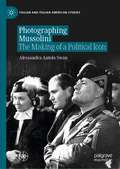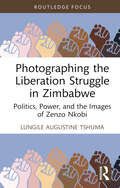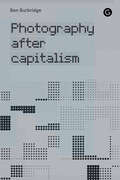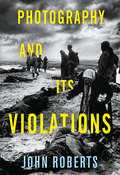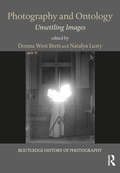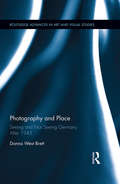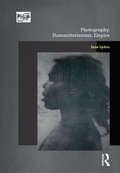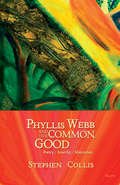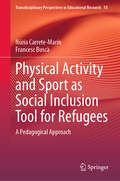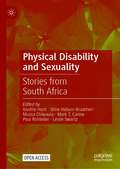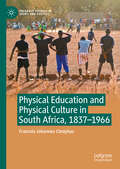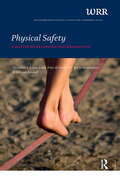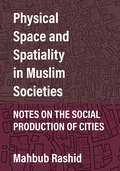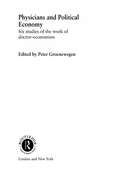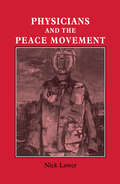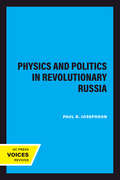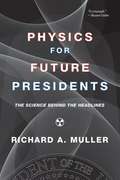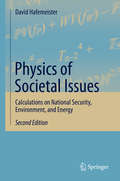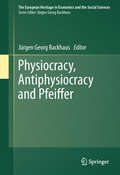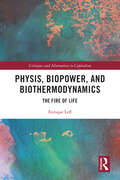- Table View
- List View
Photographing Mussolini: The Making of a Political Icon (Italian and Italian American Studies)
by Alessandra Antola SwanThis pioneering book offers the first account of the work of the photographers, both official and freelance, who contributed to the forging of Mussolini's image. It departs from the practice of using photographs purely for illustration and places them instead at the centre of the analysis. Throughout the 1930s photographs of the Italian dictator Benito Mussolini were chosen with much care by the regime. They were deployed to highlight those physical traits - the piercing eyes, protruding jaw, shaved head - that were meant to evoke the Duce's strength, determination and innate sense of leadership in the mind of his contemporaries. The chapters in this volume explore the photographic image in the socio-political context of the time and shows how it was a significant contributor to the development of Italian mass culture between the two world wars.
Photographing the Liberation Struggle in Zimbabwe: Politics, Power, and the Images of Zenzo Nkobi (Routledge Studies in the Modern History of Africa)
by Lungile Augustine TshumaAfter assuming power in 1980, the Zimbabwe African National Union (ZANU) has sought to control the narrative of the struggle for liberation from colonialism, to the exclusion of other players such as the Zimbabwe African People’s Union (ZAPU). This book investigates the ways in which photographs are being used within Zimbabwe, especially on social media, to challenge the prevailing narrative and reclaim the memories of the subjugated. The book analyses the photographs produced by Zenzo Nkobi during the struggle against colonialism. Drawing on the memories of veterans from ZAPU and its military wing the Zimbabwe People’s Revolutionary Army (ZPRA), the book shows that photographs can both act as a conduit for existing narratives, and as a tool for shaping memory narratives, and evidencing ZPRA military prowess ahead of other movements.At a time when Zimbabwe is reassessing the legacy of liberation, this book offers a powerful multidisciplinary assessment for researchers across the fields of history, memory, political science, African studies, and media studies.
Photography After Capitalism
by Ben BurbridgeA lively and polemical analysis of photography and today's vernacular photographic culture.In Photography After Capitalism, Benedict Burbridge makes the case for a radically expanded conception of photography, encompassing the types of labor too often obscured by black-boxed technologies, slick platform interfaces, and the compulsion to display lives to others. His lively and polemical analysis of today's vernacular photographic cultures shines new light on the hidden work of smartphone assembly teams, digital content moderators, Street View car drivers, Google "Scan-Ops,"low-paid gallery interns, homeless participant photographers, and the photo-sharing masses.
Photography and Its Violations (Columbia Themes in Philosophy, Social Criticism, and the Arts)
by John RobertsTheorists critique photography for "objectifying" its subjects and manipulating appearances for the sake of art. In this bold counterargument, John Roberts recasts photography's violating powers of disclosure and aesthetic technique as part of a complex "social ontology" that exposes the hierarchies, divisions, and exclusions behind appearances.The photographer must "arrive unannounced" and "get in the way of the world," Roberts argues, committing photography to the truth-claims of the spectator over the self-interests and sensitivities of the subject. Yet even though the violating capacity of the photograph results from external power relations, the photographer is still faced with an ethical choice: whether to advance photography's truth-claims on the basis of these powers or to diminish or veil these powers to protect the integrity of the subject. Photography's acts of intrusion and destabilization, then, constantly test the photographer at the point of production, in the darkroom, and at the computer, especially in our 24-hour digital image culture. In this game-changing work, Roberts refunctions photography's place in the world, politically and theoretically restoring its reputation as a truth-producing medium.
Photography and Ontology: Unsettling Images (Routledge History of Photography)
by Natalya Lusty Donna West BrettThis edited collection explores the complex ways in which photography is used and interpreted: as a record of evidence, as a form of communication, as a means of social and political provocation, as a mode of surveillance, as a narrative of the self, and as an art form. What makes photographic images unsettling and how do the re-uses and interpretations of photographic images unsettle the self-evident reality of the visual field? Taking up these themes, this book examines the role of photography as a revelatory medium underscored by its complex association with history, memory, experience and identity.
Photography and Place: Seeing and Not Seeing Germany After 1945 (Routledge Advances in Art and Visual Studies)
by Donna West BrettAs a recording device, photography plays a unique role in how we remember places and events that happened there. This includes recording events as they happen, or recording places where something occurred before the photograph was taken, commonly referred to as aftermath photography. This book presents a theoretical and historical analysis of German photography of place after 1945. It analyses how major historical ruptures in twentieth-century Germany and associated places of trauma, memory and history affected the visual field and the circumstances of looking. These ruptures are used to generate a new reading of postwar German photography of place. The analysis includes original research on world-renowned German photographers such as Thomas Struth, Thomas Demand, Michael Schmidt, Boris Becker and Thomas Ruff as well as photographers largely unknown in the Anglophone world.
Photography, Humanitarianism, Empire (Photography, History: History, Photography)
by Jane LydonWith their power to create a sense of proximity and empathy, photographs have long been a crucial means of exchanging ideas between people across the globe; this book explores the role of photography in shaping ideas about race and difference from the 1840s to the 1948 Declaration of Human Rights. Focusing on Australian experience in a global context, a rich selection of case studies – drawing on a range of visual genres, from portraiture to ethnographic to scientific photographs – show how photographic encounters between Aboriginals, missionaries, scientists, photographers and writers fuelled international debates about morality, law, politics and human rights.Drawing on new archival research, Photography, Humanitarianism, Empire is essential reading for students and scholars of race, visuality and the histories of empire and human rights.
Phyllis
by Howard FastTwo scientists—one American and one Russian—form a pact for nuclear disarmament that threatens to bring civilization to its kneesThe physicists met during a nuclear conference in London. Wanting to hurry America and the Soviet Union into nuclear non-proliferation, they each construct a crude atomic bomb, hiding one in New York and one in Moscow, and then they disappear. The United States and the USSR have forty days to renounce nuclear weapons, or two world capitals will burn. The American government chooses police detective Thomas Clancy to save his city. As a cop with a background in physics, he enters the faculty of Knickerbocker University to investigate the American professor. Clancy&’s hope is that Phyllis Goldmark, the vanished physicist&’s former lover, may know some clue to his location. The clock is ticking as the fate of millions rests on the shoulders of Phyllis and Clancy. This ebook features an illustrated biography of Howard Fast including rare photos from the author&’s estate.
Phyllis Webb and the Common Good
by Stephen CollisPhyllis Webb is a poet around whom archetypes tend to cluster: the reclusive artist; the distraught, borderline suicidal Sapphic woman poet. While on the surface she seems someone supremely disinterested in the public sphere, argues Stephen Collis in this brilliant and revealing new celebration of her work, Webb is no domestic, as a creator or a critic. Her work sweeps into the wilds of politics, philosophy, economics and her slim books speak volumes. If there is a sense of abandoned projects hovering as ghosts on the margins of her books it is a purposeful abandonment, an anarchist's abdication of positions of power and authority. Webb's work points steadily towards the idea that the poem is not a commodity to be hoarded, but a response-ability to be shared, an aspect of the commons and our "common good." The gradual dissolution of the lyric I traceable over the course of her writing career mirrors both the development of avant-garde poetics across the century and the anarchist inflected notion of the poem as a common property --an effect of language (the commons) and not the self (the private). In this sense Collis reads Webb's poetry as it conjoins (and simultaneously diverges from) various twentieth-century literary movements and moments--it is this tension in her work which makes Webb a modernist whose writing nevertheless provides an opening into postmodernism. Her work constructs bridges across numerous conceptual divides: the (porous) boundaries between poetry and painting, poetry and politics, modernism and postmodernism, the lyric and the long poem, the ontologies of the self and the other. The changes across decades of Webb's writing, Collis argues, mirror changes in the approaches of the twentieth-century avant-garde to questions of responsibility and abstraction, locating her work in the Image-Nation of radical, philosophically engaged poetries that have flourished throughout twentieth-century North America.
Physical Activity Across the Lifespan
by Thomas P. Gullotta Aleta L. MeyerThe statistics are disturbing: steadily rising numbers of sedentary overweight children and obese teens, and a generation looking at a shorter life expectancy than their parents'. But while it may be obvious that physical fitness benefits both the mind and body, a growing research base is supplying evidence of why this is so, and how these benefits may be reproduced in greater numbers. Physical Activity Across the Lifespan makes a clear, scientific case for exercise, sports, and an active lifestyle in preventing illness and establishing lifetime health habits at both the individual and the population levels. The book focuses on key aspects of physical/mental well-being--weight, mood, and self-regulation--and the role of physical activity in public health and school-based interventions targeting these areas. Contributors review definitional and measurement issues salient to understanding what physical activity is, to analyzing benefits of participation, and to implementing effective interventions. Also addressed are limitations of current research, steps needed to continue building the field, and emerging therapeutic possibilities for activity, such as the role of rough and tumble play in preventing ADHD. Included in the coverage: Physical activity, cognition, and school performance. The influence of social and built environments on physical activity in middle-aged and older adults. Preventing and treating obesity through physical activity. Physical activity in preventing drug use and treating chemical dependence. Antidepressant properties of physical activity. Schools as a foundation for physical activity and an active lifestyle. Physical activity as an adjunct or booster to existing interventions. Physical Activity Across the Lifespan is an innovative text for researchers and practitioners in various disciplines including health promotion/disease prevention, child and school psychology, education, health psychology, and public health, as well as program developers and policymakers in these areas.
Physical Activity and Sport as Social Inclusion Tool for Refugees: A Pedagogical Approach (Transdisciplinary Perspectives in Educational Research #10)
by Núria Carrete-Marín Francesc BuscàThis book addresses the social benefits of physical activity and sport in promoting the social and educational inclusion of refugees living in Europe in line with Sustainable Development Goals 4, 10 and 16. It provides a theoretical framework supported by evidence obtained from a case study in the Spanish context. The book demonstrates how universities and formal and non-formal educational institutions, by means of service-learning activities managed by physical and social educators, enable refugees and students to practice physical activity, develop further learning and establish stable social networks. It shows how a pedagogical approach to physical activity can improve relationships between students and refugees and promote inclusion of all. It discusses the value of diversity in education and educational research, as well as transdisciplinarity in new educational and research approaches.
Physical Disability and Sexuality: Stories from South Africa
by Leslie Swartz Poul Rohleder Xanthe Hunt Stine Hellum Braathen Mussa Chiwaula Mark T. CarewThis open access edited volume explores physical disability and sexuality in South Africa, drawing on past studies, new research conducted by the editors, and first-person narratives from people with physical disabilities in the country. Sexuality has long been a site of oppression and discrimination for people with disabilities based on myths and misconceptions, and this book explores how these play out for people with physical disabilities in the South African setting. One myth with which the book is centrally concerned, is that people with disabilities are unable to have sex, or are seen as lacking sexuality by society at large. Societal understandings of masculinity, femininity, bodies and attractiveness, often lead people with physical disabilities to be seen as being undesirable romantic or sexual partners. The contributions in this volume explore how these prevailing social conditions impact on the access to sexual and reproductive healthcare, involvement in romantic relationships, childbearing, and sexual citizenship as a whole, of people with physical disabilities in the Western Cape of the country. The authors' research, and first person contributions by people with physical disabilities themselves, suggest that education and public health policy must change, if the sexual and reproductive health rights and full inclusion of people with disabilities are to be achieved.
Physical Education and Physical Culture in South Africa, 1837-1966 (Palgrave Studies in Sport and Politics)
by Francois Johannes CleophasThe interconnectedness between sport and colonialism has long been a matter of interest to sport historians. Consequently, a large number of scholarly works exist on physical education and physical culture history, but there is no significant work on this within a South African context, both nationally and at community level. This book therefore provides the first historical account of physical education and physical culture in Cape Town, South Africa and its surrounding areas in the Western Cape.
Physical Safety: A Matter of Balancing Responsibilities (WRR Publications)
by Peter de Goede Marjolein B.A. van Asselt V.C. Karin Ammerlaan Jelle van AanholtPhysical safety is a core task of government. It is neither surprising nor unreasonable for government to be held accountable for hazardous substances, for food safety, for flood protection, for the spread of infectious diseases, or for the risks involved in new technologies. In 2011 the Dutch Ministry of the Interior and Kingdom Relations asked the Scientific Council for Government Policy (WRR) to investigate the scope for the development of a generic risk policy in relation to physical safety. Do citizens and businesses take sufficient responsibility for physical safety? Could the government assume a smaller role, and what part could the business community play in this? In this report the WRR argues that in order to answer these questions a distinction needs to be made between incidents, damage, risk and uncertainty. In addition, the wrr recommends that the thinking about responsibility for safety should not be placed in the perspective of a failing government, but that the central focus should be on the ambition of good governance. Finally, the WRR suggests that thinking about safety from the perspective of damage offers a useful framework for thinking through and reassessing the distribution of responsibilities. Responsibility for preventing, limiting and dealing with damage can only be assigned in advance, not retrospectively.
Physical Security Assessment Handbook: An Insider’s Guide to Securing a Business
by Michael KhairallahPhysical Security Assessment Handbook: An Insider’s Guide to Securing a Business, Second Edition has been fully updated to help you identify threats to your organization and be able to mitigate such threats. The techniques in this comprehensive book outline a step-by-step approach to: Identify threats to your assets Assess physical security vulnerabilities Design systems and processes that mitigate the threats Set a budget for your project and present it to company managers Acquire the products through competitive bidding Implement the recommended solutions Each chapter walks you through a step in the assessment process, providing valuable insight and guidance. There are illustrations and checklists that help simplify the process and ensure that the right course is taken to secure your company. This book provides seasoned advice on the competitive bidding process as well as legal issues involved in facility security. After reading it, you will know how to assess your security needs, specify the right products, and oversee and manage the project and installation. It concludes with project implementation, and the necessary follow-up after installation, to verify the proper use of the new security solutions. Physical Security Assessment Handbook, Second Edition provides a structure for best practices in both specifying system components as well as managing the acquisition and implementation process. It represents the culmination of the author’s 44 years of experience in the design, installation, and project management of security system solutions. This is a valuable resource for security managers, security consultants, and even experienced industry professionals to best approach and organize security assessment projects.
Physical Space and Spatiality in Muslim Societies: Notes on the Social Production of Cities
by Mahbub RashidMahbub Rashid embarks on a fascinating journey through urban space in all of its physical and social aspects, using the theories of Foucault, Bourdieu, Lefebvre, and others to explore how consumer capitalism, colonialism, and power disparity consciously shape cities. Using two Muslim cities as case studies, Algiers (Ottoman/French) and Zanzibar (Ottoman/British), Rashid shows how Western perceptions can only view Muslim cities through the lens of colonization—a lens that distorts both physical and social space. Is it possible, he asks, to find a useable urban past in a timeline broken by colonization? He concludes that political economy may be less relevant in premodern cities, that local variation is central to the understanding of power, that cities engage more actively in social reproduction than in production, that the manipulation of space is the exercise of power, that all urban space is a conscious construct and is therefore not inevitable, and that consumer capitalism is taking over everyday life. Ultimately, we reconstruct a present from a fragmented past through local struggles against the homogenizing power of abstract space.
Physicians and Nurses in the Dutch Armed Forces: Professional Identity, Ethical Dilemmas, and Agency (Military and Humanitarian Health Ethics)
by Francesca HooftThis book analyzes the challenges and ethical dilemmas military physicians and nurses experienced while deployed on military operations—and how they dealt with them. It traces the developments during the deployment of medical personnel within the Dutch armed forces between 1990 and 2010. Throughout this time, medical personnel were confronted with anything from a scarcity of supplies to military hierarchy, factors that potentially threatened their medical standards as well as their professional autonomy. They had to navigate between differing expectations, priorities, and moral codes of the medical and the military profession. This book makes an original and indispensable contribution to academic debates on medical personnel in the armed forces and dual loyalty, ethical decision-making processes, moral competence, and the salience of (professional) identity in the role of perception, decision-making and coping, both during and after deployment. The target audience for this book is primarily academics working in the social sciences, humanities, medicine, and ethics. Military and medical practitioners, policymakers, NGOs, and educational institutions may use the book’s findings for policy and educational purposes.
Physicians and Political Economy: Six Studies of the Work of Doctor Economists (Routledge Studies In The History Of Economics Ser. #Vol. 49)
by Peter GroenewegenWhy did Economics, in its formative phase, have so much input from medically educated writers? The innovations that physicians brought to their economic discourse played a key role in shaping the future of the discipline, and this volume draws together the work of leading international academics to address this fascinating topic. This book examines
Physicians and the Peace Movement
by Nick LewerFirst Published in 1992. Routledge is an imprint of Taylor & Francis, an informa company.
Physics and Politics in Revolutionary Russia (California Studies in the History of Science #7)
by Paul R. JosephsonAided by personal documents and institutional archives that were closed for decades, this book recounts the development of physics—or, more aptly, science under stress—in Soviet Russia up to World War II. Focusing on Leningrad, center of Soviet physics until the late 1930s, Josephson discusses the impact of scientific, cultural, and political revolution on physicists' research and professional aspirations.Political and social revolution in Russia threatened to confound the scientific revolution. Physicists eager to investigate new concepts of space, energy, light, and motion were forced to accommodate dialectical materialism and subordinate their interests to those of the state. They ultimately faced Stalinist purges and the shift of physics leadership to Moscow. This account of scientists cut off from their Western colleagues reveals a little-known part of the history of modern physics.
Physics for Future Presidents: The Science Behind The Headlines
by Richard A. MullerLearn the science behind the headlines-the tools of terrorists, the dangers of nuclear power, and the reality of global warming.<P><P> We live in complicated, dangerous times. They are also hyper-technical times. As citizens who will elect future presidents of the most powerful and influential country in the world, we need to know-truly understand, not just rely on television's talking heads-if Iran's nascent nuclear capability is a genuine threat to the West, if biochemical weapons are likely to be developed by terrorists, if there are viable alternatives to fossil fuels that should be nurtured and supported by the government, if nuclear power should be encouraged, and if global warming is actually happening. This book is written in everyday, nontechnical language on the science behind the concerns that our nation faces in the immediate future. Even active readers of serious journalism will be surprised by the lessons that the book contains. It is "must-have" information for all presidents-and citizens-of the twenty-first century. <P> Winner of the 2009 Northern California Book Award for General Nonfiction.<P> Note: There is a publisher quality version of this book at https://www.bookshare.org/browse/book/1055976/ that includes the images for some of the figures in the book. Because of electronic rights issues however, not all of the figures are in that book and the captions for the missing figures are left out as well. All captions are available in this scanned version.
Physics of Societal Issues
by David HafemeisterThis book provides the reader with essential tools needed to analyze complex societal issues and demonstrates the transition from physics to modern-day laws and treaties. This second edition features new equation-oriented material and extensive data sets drawing upon current information from experts in their fields. Problems to challenge the reader and extend discussion are presented on three timely issues: * National Security: Weapons, Offense, Defense, Verification, Nuclear Proliferation, Terrorism * Environment: Air/Water, Nuclear, Climate Change, EM Fields/Epidemiology * Energy: Current Energy Situation, Buildings, Solar Buildings, Renewable Energy, Enhanced End-Use Efficiency, Transportation, Economics Praise for the first edition: "This insight is needed in Congress and the Executive Branch. Hafemeister, a former Congressional fellow with wide Washington experience, has written a book for physicists, chemists and engineers who want to learn science and policy on weapons, energy, and the environment. Scientists who want to make a difference will want this book. " Richard Scribner, first Director, Congressional Science and Engineering Fellow Program, AAAS "Hafemeister shows how much one can understand about nuclear weapons and missile issues through simple back-of-the-envelope calculations. He also provides compact explanations of the partially successful attempts that have been made over the past 60 years to control these weapons of mass destruction. Hopefully, Physics of Societal Issues will help interest a new generation of physicists in continuing this work. " Frank von Hippel, Professor, Princeton, former Assistant Director, National Security, White House, OSTP "Energy policy must be quantitative. People who don't calculate economic tradeoffs often champion simplistic hardware. 'The solution is more. . . nuclear power, or electric cars, or photovoltaics, etc. ' Some simple physics will show that the true solution matches supply and demand as an 'integrated resource plan. ' Physics of Societal Issues is a good place to begin this journey. " Arthur Rosenfeld, former California Energy Commissioner, Professor-emeritus, U. of California-Berkeley
Physiocracy, Antiphysiocracy and Pfeiffer
by Jürgen BackhausPhysiocracy, or the economic theory that a nation's wealth comes from is agricultural and land development, was a popular school of thought in France in the 18th century. The contribution and significance of the Physiocrats and Antiphysiocrats are explored in detail through chapter contributions by economists, philosophers, and social historians. The book concludes that neither the Physiocrats, nor the Antiphysiocrats were pure profit maximizers and that they all had the well-being of the commonwealth in mind. It brings to light previous studies only conducted in German and is the first analysis of Pfeiffer in a century, making the book of interest to any student or scholar of political economy and the history of economic thought. The contribution and significance of the Physiocrats and Antiphysiocrats are explored in detail through chapter contributions by economists, philosophers, and social historians. It brings to light previous studies only conducted in German and is the first analysis of Pfeiffer in a century, making the book of interest to any student or scholar of political economy and the history of economic thought.
Physis, Biopower, and Biothermodynamics: The Fire of Life (ISSN)
by Enrique LeffBuilding upon the idea that our current "environmental question" arises from the history of metaphysics—which privileged thought about Being (or ontology) over the conditions of life—this book reinterprets Heraclitus’s notion of physis as the fundamental, emergent potency of life, as the category to-be-thought by thinkers. In so doing, it deconstructs the interpretation offered by Heidegger and so stresses the struggle between the creative force of life and its subjection to the human Logos or "meaning". Physis, understood as the pre-ontological potentiality of life itself, thus becomes the cornerstone of a materialist philosophy of life.Following engagements with the work of Nietzsche, Foucault, and Janicaud to explore the significance of human intervention into the realm of life via the "will to power", "biopower" and the "power of rationality" respectively, the author explores twentieth-century rearticulations of the concept of physis through a range of developments in biothermodynamics, thus grounding a new philosophy of life and a new bioeconomics in a revisited biothermodynamics centered on the concept of negentropy.An extensive engagement with the history and development of thought about the generative force of life on Earth, Physis, Biopower, Biothermodynamics, and Bioeconomics: The Fire of Life will appeal to scholars of philosophy, social theory, and political theory with interests in environmental thought, political ecology, and questions of sustainability.
